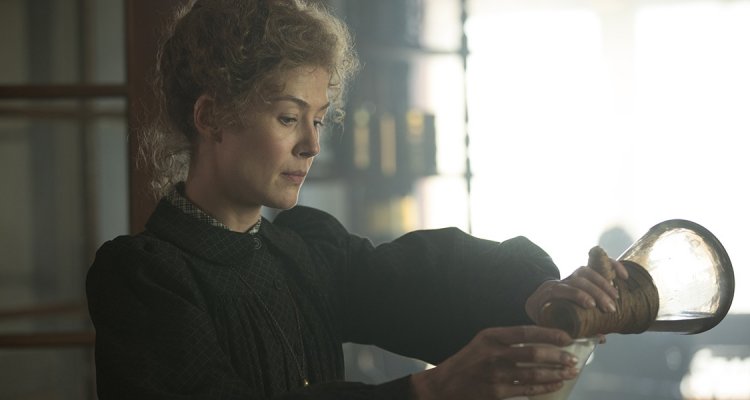The earth was once flat, the sun revolved around us, and polonium and radium were unknown. In time, there were societal combustions—ripples across space that devastated longstanding establishments. Marie Curie ignited the fuse, discovering polonium and radium en route to two Nobel Prizes. “Radioactive” opens with an elderly Curie—adorned with frazzled grey hair and wearing thin-oval sunglasses—walking through Paris in 1934 to her lab. Once there, she collapses, rushed to the hospital as her life flashes before her eyes. This flash—the first salvo in a barrage of biopic conventions—leads to the big bang, her beginning to her end. Director Marjane Satrapi’s “Radioactive” dutifully follows the life of the exciting and complex scientist, but only offers viewers and enthusiasts a dull, paint-by-numbers biopic.
READ MORE: 2019 Toronto International Film Festival: 25 Most Anticipated Movies
Initially, “Radioactive” dissects the relationship between Marie Curie (Rosamund Pike)—then Marie Skłodowska—and her husband Pierre (Sam Riley). Fiercely independent, she’s terse and to the point, intently aware of the fickleness of men—their need to control women as sexual yet purely background objects. But Pierre is unlike the others. He isn’t after her body—at least not solely—and instead loves her for her mind. He soon proposes a scientific partnership, offering his lab space if they collaborate on her theory of isolating isotopes.
READ MORE: The Best Films Of 2019… So Far
Later their relationship blossoms into a love affair; after that, marriage. Riley and Pike have fantastic and innocent chemistry (even if their French accents are a little suspect). Unfortunately, “Radioactive” doesn’t tease out their relationship. That’s understandable; while this isn’t meant to be the story of Curie and Pierre, outside their most significant discoveries—polonium, and radium—their family life is mostly reduced to two montages. When we arrive at scenes of Pierre’s radiation poisoning, the viewer scarcely takes note of her daughters Irene and Eve (whose lives are truncated through montages as well).
Upon Pierre’s death, Curie struggles, ultimately developing a close relationship with married friend Paul Langevin (Aneurin Barnard). Sex may not be a regular part of the Curie historical narrative, but “Radioactive,” like life, finds a way. When her liaisons with Paul spill into the papers—driven both by xenophobia (Curie was Polish) and Victorian prudishness—mobs swirl outside her window. Curie openly discusses sex and exposes her body without shame. There are moments with Marie and her husband Pierre lying naked on the grass and Curie and Paul in bed. She’s defiant in the face of sexism and contemptuous of small minds.
READ MORE: Marjane Satrapi’s Marie Curie Biopic Set For 2020 Release
Still, even setting aside “Radioactive’s” sensual proclivities, the biopic suffers from a languid and dull pace. The film’s score—based around theremins and synths—is an alien and risky gambit on the part of “Persepolis“ filmmaker Satrapi. This experiment, unlike Curie’s, isn’t a success. Instead, “Radioactive” desperately depends upon Pike to deliver, a burden she carries with ease. Playing a woman with repressed trauma—Marie’s mother died when she was a child—her acidic barbs arrive with sharp and staccato-like precision.
Pike’s performance is reminiscent of Emma Thompson’s P.L. Travers in “Saving Mr. Banks,” another film based around crushing suppression, guilt, and a woman protecting her intellectual property with brutal honesty against dishonest men. Pike doesn’t necessarily reach the heights of Thompson, but she does scale to a cathartic emotional peak when she begs an audience with a seer. Despite expressing skepticism towards seances and the afterlife, she despairs and wants to feel her deceased husband’s presence one last time. Banging on the door, pleading, Curie shatters, and Pike hurdles into that humanity like radical combustion with tears that crash with the sharpness of beakers hitting the floor.
If “Radioactive” spent more time with Curie’s eccentricities—instead of performing unnecessary flash-forwards to Chernobyl, Nagasaki, and the widespread atomic bomb testing in Nevada—we might have arrived at a real character study. Instead, the biopic’s strained narrative bonds dissolve, awash in a series of disconnected events. Even with Pike’s heroics on display, Satrapi’s “Radioactive” never amounts to a grand discovery. It’s just a footnote in biopic history. [C+]
Click here for our complete coverage from this year’s Toronto International Film Festival.

